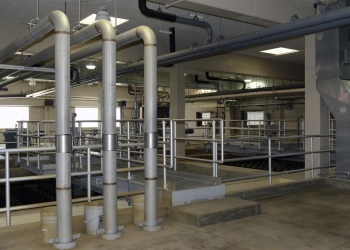News
Bartlesville
Posted: Sep 23, 2024 9:55 AMUpdated: Sep 23, 2024 9:55 AM
CITY MATTERS: Bartlesville Water Sources Update and Water Reuse Initiatives

Tom Davis
During a recent appearance on KWON Radio's "CITY MATTERS," Bartlesville City Water Utilities Manager Terry Lauritsen provided crucial updates on the city's water supply sources and discussed innovative water reuse practices. With a growing focus on long-term sustainability, the city is proactively addressing current water challenges while securing future supplies.
Current Water Supply Sources
Bartlesville’s water supply is sourced from four main locations:
Hula Lake – the largest and primary water source.
Copan Lake – another essential water source where Bartlesville holds water rights.
Hudson Lake – a city-owned lake just northwest of the town.
The Caney River – Bartlesville’s original water supply, established in the 1930s and still actively in use today.
Over recent years, the region has faced water supply challenges due to severe droughts, particularly impacting Hula and Copan Lakes. In fact, the recent drought was the second-worst on record for Bartlesville. However, after significant rainfall at the start of 2023, water restrictions were lifted, and supply levels stabilized. Despite this, the city continues to plan for future water security.
Exploring New Water Sources
The city has been working since the early 2000s to diversify its water sources, examining multiple options for long-term sustainability. Lauritsen explained that the top four viable sources include:
Hula Lake – Increasing water storage by reallocating space currently reserved for flood control. This involves raising the lake's elevation, a process that is expected to be cost-effective and beneficial for the city.
Copan Lake – Similar to Hula Lake, plans include reallocating flood control space for water storage. Bartlesville is working with legislative representatives and the town of Copan to acquire additional water rights.
Ada-Vemusa Aquifer – A major aquifer in central Osage County, while abundant in water, its slow recharge rate limits how much can be drawn daily. The city estimates it could extract about 1.4 million gallons per day, but this falls short of the city's needs, so it remains a supplementary option.
Kaw Lake – A massive lake with a vast watershed that could meet Bartlesville’s needs for the next 100 years. However, the infrastructure costs to transport water from Kaw Lake would be in the hundreds of millions of dollars.
Each of these options is being thoroughly researched to assess their long-term viability, costs, and feasibility.
Innovative Water Reuse Initiative
In addition to exploring new sources, Bartlesville is breaking ground on an innovative water reuse project at its wastewater treatment plant. Water reuse involves treating wastewater and returning it to the Caney River, where it is collected, treated again, and then used as potable water.
Though this process is new for Oklahoma, it has been successfully implemented in other parts of the country, such as Texas. Bartlesville’s water reuse pilot program was completed in June 2023, demonstrating the potential of this method to enhance water quality while bolstering supply. By adding cleaner, treated water back into the Caney River, the water treatment process becomes more efficient and environmentally friendly.
A Community Effort and Education on Water Conservation
Lauritsen also emphasized the importance of public awareness in supporting water sustainability. He highlighted the role residents can play in preventing sewer blockages by avoiding flushing items like "flushable" wipes, which do not break down and often lead to plumbing issues. Proper disposal of materials such as wipes and bacon grease helps the city’s wastewater systems operate smoothly.
Securing Bartlesville’s Water Future
The combined efforts of water source expansion, legislative action, and innovative technology will position Bartlesville to secure its water needs for the next 50 to 100 years. While challenges remain, including high costs and lengthy approval processes, the city is determined to ensure a reliable water supply for its residents well into the future. Through partnerships with state and federal lawmakers, Bartlesville continues to push forward, exploring all available avenues to safeguard its water resources.
« Back to News













